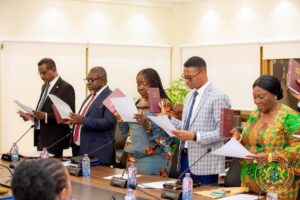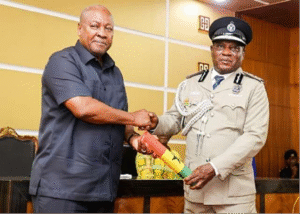
Dr Matthew Opoku Prempeh
Just when the dust was beginning to settle on the backlash against Dr. Matthew Opoku Prempeh’s controversial comments about Ghana’s first Prime Minister, Dr. Kwame Nkrumah, the 2024 NPP running mate has once again ignited tensions by revisiting the legacy of the nation’s founding father. During a campaign tour in the Ashanti Region on August 16, 2024, Dr. Opoku Prempeh, also known as NAPO, delved into the history of the New Patriotic Party (NPP), drawing a direct link between its origins and what he described as the persecution of Ghanaian chiefs under Nkrumah’s regime.
In a radio interview, NAPO claimed that the NPP’s roots can be traced back to various political groups formed by chiefs who felt oppressed during Nkrumah’s tenure. He alleged that Nkrumah’s government hunted down, arrested, and imprisoned chiefs across the country, leading many to flee the country in fear.
“Kwame Nkrumah went and arrested all the chiefs of Annor and sent them to prison,” NAPO asserted. He went on to accuse Nkrumah of shifting the Volta regional capital from Hohoe to Ho as part of his campaign against local traditional leaders. “Chiefs from Accra all came and formed their party, and even Muslims from the Zongo communities also formed their party to unite with the United Party,” he added, painting a picture of widespread resistance against Nkrumah’s rule.
Dr. Opoku Prempeh’s comments have sparked a fresh wave of controversy, with many questioning the sincerity of his earlier apology for the derogatory remarks he made about Nkrumah. His critics argue that by reopening old wounds, he risks alienating voters and undermining the NPP’s campaign.
A behavioral expert weighed in on the matter, stating, “I don’t think Dr. Prempeh meant his apology for the backlash. If he did, he would have shelved anything on Dr. Nkrumah sine die. It’s injurious to his person and Dr. Bawumia’s campaign as a whole. It casts him in a bad light.”
The timing of NAPO’s remarks has also raised eyebrows, as the NPP seeks to galvanize support ahead of the upcoming elections. While some within the party may view his comments as a bold reminder of the NPP’s historical roots, others worry that it could backfire, particularly among voters who revere Nkrumah’s legacy.
As the campaign heats up, the fallout from Dr. Opoku Prempeh’s latest remarks remains to be seen. Will his attempt to highlight the NPP’s deep connections to Ghana’s traditional leadership resonate with voters, or will it further entrench divisions within the electorate? One thing is certain: NAPO’s comments have reignited a debate that many thought had been put to rest.






